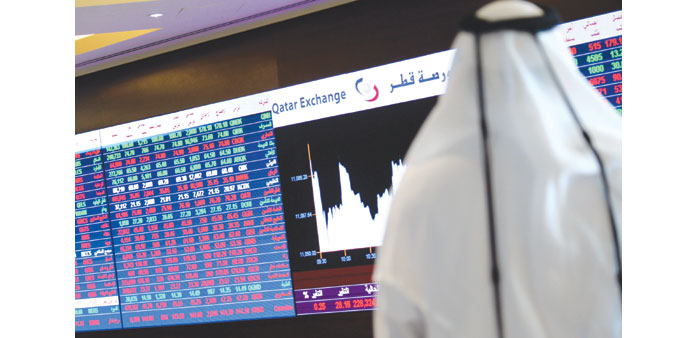An across the board selling – particularly in telecom, real estate and insurance counters – was seen in the QSE, which was the second worst performer among the Gulf Cooperation Council bourses during the week.
Foreign institutions’ substantially lower buying interests and increased net profit booking by their domestic counterparts led the QSE close in the red during the week which saw Al Meera Consumer Goods Company decide to call off the proposed deal to acquire Spinney's Qatar, five months after it first announced an indirect acquisition plan.
Large and midcap equities witnessed heavier offloading during the week which saw QSE showcase a dozen listed companies, constituting around half of capitalisation, before global fund managers in London, in a bid to attract foreign investments.
Despite local retail investors’ weakened net selling, the 20-stock Qatar Index plunged 4.29% during the week which witnessed a Gulf International Services (GIS) subsidiary Gulf Helicopters Company sign a new contract with Saudi Aramco to perform heavy maintenance on Saudi Arabian oil major’s fleet of AgustaWestland AW 139.
Dubai saw its bourse plummet 5.28%, Abu Dhabi (2.53%), Saudi Arabia (2.2%) and Kuwait (0.35%); while Muscat and Bahrain gained 0.62% and 0.2% respectively during the week which saw Ooredoo Qatar sign a three-year contract with Nokia for the upgrade and expansion of its existing mobile broadband network across the country to meet ever-growing subscriber demands.
QSE is down 6.53% year-to-date compared to a steep fall of 8.48% in Bahrain, 4.31% in Kuwait and 3.69% in Saudi Arabia; whereas Muscat gained 10.61%, Dubai (4.97%) and Abu Dhabi (2.82%).
Opening the week marginally higher at 10,188 points on Sunday, the market kept weakening for the subsequent sessions to settle at 9,749 points at the end of the week, which saw trading turnover and volumes plunge.
The week by and large witnessed saw global oil prices on a weak wicket on nagging worries over excess supplies but on Wednesday and Thursday saw the oil prices surge and break the $45 level on concerns over output in Canada and Libya.
Islamic stocks witnessed comparatively slower declines than the conventional ones during the week which saw banking, realty, industrials and consumer goods stocks constituted more than 85% of the trading volumes in the QSE.
The 20-stock Total Return Index plummeted 4.29%, All Share Index (comprising wider constituents) by 3.98% and Al Rayan Islamic Index 3.9% during the week which saw Qatar First Bank dominate the trading ring in terms of volume and value.
Telecom stocks substantially lost 5.91%, real estate (5.7%), insurance (4.58%), industrials (3.87%), banks and financial services (3.38%), transport (3.08%) and consumer goods (1.86%) during the week which saw the listed companies' net profit plunge 18% during January-March 2016 against a steep 21% jump in the previous year period.
Market capitalisation eroded 4.14% to QR526.76bn with large, mid, small and microcap equities melting 4.17%, 3.19%, 2.9% and 1.89% respectively during the week.
Large, mid, small and microcap stocks have fallen 8.17%, 3.37%, 3.03% and 0.7% respectively year-to-date.
Of the 44 stocks, as many 36 declined, while six advanced and two were unchanged during the week. Nine of the 13 banks and financial services, eight of the nine industrials; five of the eight consumer goods; and all of the five insurers, the four real estate, the three transport and the two telecom stocks closed lower during the week.
About 82% of the scrips were in the red with major losers being Ooredoo, Vodafone Qatar, Ezdan, Barwa, Mazaya Qatar, Qatar Insurance, Industries Qatar, GIS, Mesaieed Petrochemical Holding, Aamal Company, QNB, Islamic Holding Group, Doha Bank, Gulf Warehousing, Nakilat and Widam Food; even as Alijarah Holding, Dlala and Al Meera were seen bucking the trend during the week.
Foreign institutions’ net buying declined considerably to QR8.07mn compared to QR34.86mn the previous week.
Domestic institutions’ net profit booking strengthened perceptibly to QR15.34mn against QR1.94mn the week ended April 28.
However, local retail investors’ net profit booking fell substantially to QR7.8mn compared to QR48.06mn the previous week.
Non-Qatari individual investors’ net buying declined to QR15.08mn against QR15.32mn the week ended April 28.
Total trade volume fell 30% to 42.5mn shares, value by 25% to QR1.32bn and transactions by 20% to 21,986 during the week.
The banks and financial services sector saw 47% plunge in trade volume to 16.62mn equities, 36% in value to QR445.15mn and 29% in deals to 7,649.
The industrials sector’s trade volume plummeted 45% to 6.67mn stocks, value by 44% to QR249.21mn and transactions by 28% to 4,145.
However, the market witnessed 20% surge in the insurance sector’s trade volume to 0.61mn shares, 29% in value to QR45.12mn and 4% in deals to 507.
The telecom sector’s trade volume soared 18% to 3.23mn equities but value shrank 11% to QR77.4mn. Transactions rose 5% to 2,622.
There was 15% expansion in the consumer goods sector’s trade volume to 5.19mn stocks and 8% in value to QR273.99mn but on 31% decline in deals to 2,447.
The transport sector’s trade volume increased 9% to 2.4mn shares, while value was down 3% to QR81.85mn. Transactions were up 3% to 1,284.
The real estate sector reported 5% jump in trade volume to 7.78mn equities but on 1% fall in value to QR149.76mn; even as there was 6% rise in deals to 3,332.
In the debt market, there was no trading of treasury bills and government bonds during the week.

